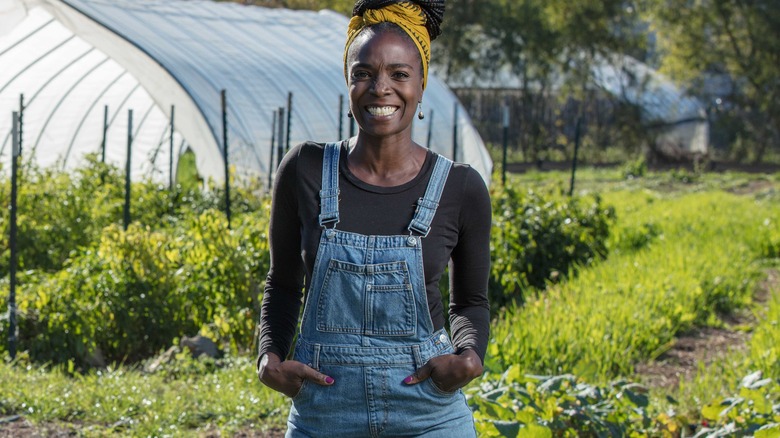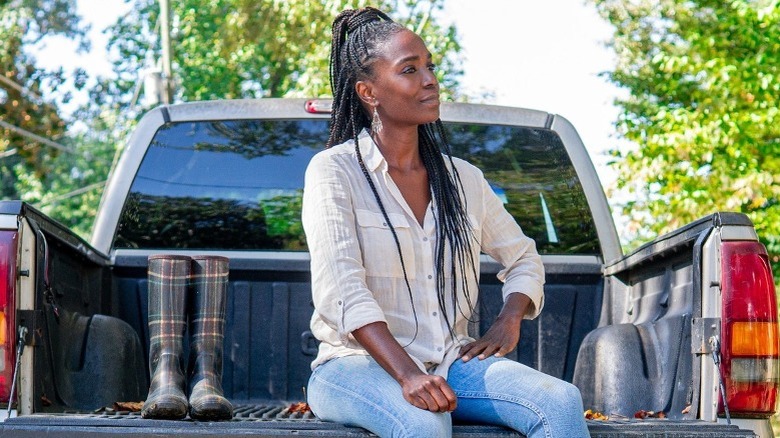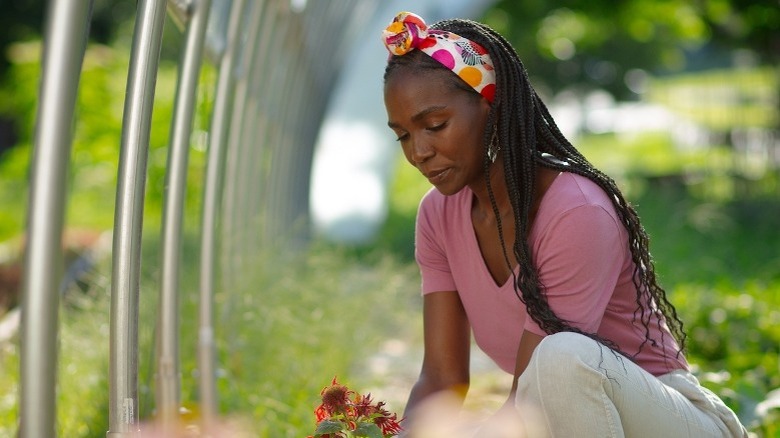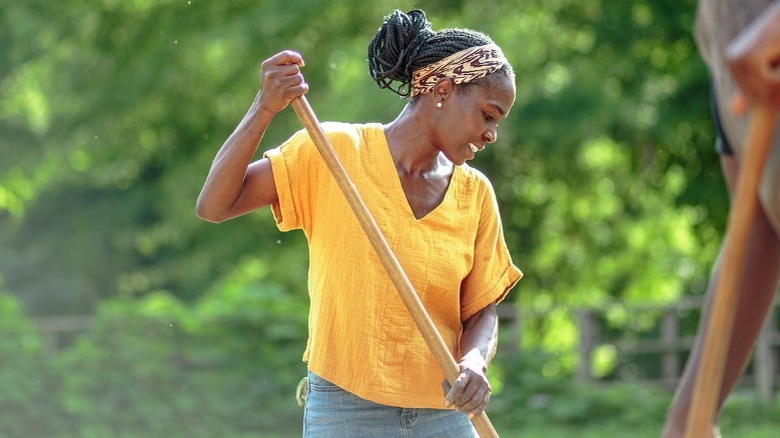Homegrown's Jamila Norman Details Farming Life And Garden Advice - Exclusive Interview
With unpredictable grocery prices eating away at people's paychecks all over the country, it's no surprise that vegetable gardens and urban farms have undergone a major renaissance in recent years. However, for every homeowner who achieves a bountiful harvest in their backyard featuring all their favorite veggies, there are many who can never quite get their dream garden to take root. Jamila Norman, internationally recognized urban farmer and star of the hit show "Homegrown," seeks to change this through healthy doses of education and inspiration. All you need are seeds, a little compost, and a whole lot of sunlight.
In an exclusive interview with House Digest, the food activist and mother behind Atlanta's Patchwork City Farms explains how it takes more than wishful thinking and some seeds to pull off a successful harvest. Thankfully, the Magnolia Network veteran is more than happy to offer expert advice for homeowners who seek to transform their outdoor spaces into beautiful and functional backyard farms. She also dishes on the state of her own urban farm after unprecedented winter weather in Atlanta threatened to snuff out its entire harvest.
Talking Homegrown Season 3 and Patchwork City Farms
With Season 3 of "Homegrown" now airing, what can viewers expect from fresh episodes of the program?
Viewers can expect variety in the families and the situations that we are flipping. We're helping a family who's retired, and they opened up a brewery, so we help them grow hops. We've got more farm animals; we've got some miniature cows; we've got some goats. We have a lot of different scenarios of people that are interested in growing and people [in different places] in their journey in life. It's a lot of inspiration for a wide variety of audiences, and it definitely stretched us in terms of being creative and offering solutions to each of the unique situations.
What is your favorite memory or behind-the-scenes episode that occurred while making the show?
I don't think that episode has rolled out yet, but when we were redoing Pam's house, she wanted baby goats. We went to visit this farm outside of the city, and we got to pick up the goats, and the whole crew, all of us, lost it, in sheer delight over baby goats. She had goats; she had peacocks; she had these miniature donkeys. It was pretty fun.
In January, you revealed via social media that a winter storm decimated 90% of Patchwork City Farms' crops. How's the farm doing now? Did you receive any support from the community?
Yes. Oh my God, that was insane. It was definitely unprecedented in Georgia's history, how low the temperatures got. I announced it and put out a call for support, and the community came out in droves to support, and people donated. That helped us to be able to get our new plants started up and get seeds to our greenhouse supplier so they can get us new plants. We're up to maybe 80% of the farm that has been replanted already from what we've lost, and we've already started going back to a local farmer's market and selling. We're up to maybe seven or eight crops that we're harvesting on a weekly basis and taking to market. I'd say we're about 50% back, and by the end of April, we'll be rocking and rolling.
Advice for beginner gardeners
In your experience, what is the biggest obstacle people stumble upon when starting a garden for the first time? Is there any advice you like to offer to beginners?
Pick a place that has lots of sun. That's the biggest thing. People pick the wrong place — so lots of sun. The second important thing is to buy the best soil that you can afford. Do not skimp out on the soil. [Buy] really good compost that you're going to add to the soil that you have already if you're growing in the ground. Or if you are building some raised beds, make sure to seek out good-quality compost to fill those beds with. Even if you're growing in pots, buy good quality, and that would be soil that has a lot of compost already in it. It's formulated for growing vegetables.
Usually, on the bag, they'll have [a] picture — they'll either have flowers, or they'll have vegetables. You want to make sure you're picking the stuff that is for growing vegetables. It would already have, hopefully, some organic fertilizers and some other beneficial bacteria and mushroom stuff in it. All of that is going to give you a great foundation. Then you have a lot of creativity to pick out the seeds and the plants and grow what you like and what you would eat.
Some homeowners may find starting a garden to be daunting before discovering the wealth of resources made available in their community. What would you recommend to urban farmers and gardeners who are in need of resources and expertise?
If you're looking for information or guidance, definitely [read] a lot of gardening books, definitely [go] online, like YouTube. I like to consult with university resources because they have a lot of studies. If you do a search and an article comes up, and you see maybe it's attached to a university or organizations that are based in agricultural work, those tend to have a little bit more credible information. Within your community, if there are community gardens, gardening clubs, or anything like that, those are great resources of people and groups to reach out to if you're looking for a community to be a part of.
As an urban farmer, if someone's aspiring to take this on as a career or a livelihood, then [reach] out to a farm in your area – or not [in your area], if you're willing to travel – and actually work on a farm, whether that is through an internship or coming on as a farmhand. Those are great ways.
And people will do a lot of learning through the Extension Service, which is an extension of USDA through the university system. All around the country, they can do Master Gardener programs, they can do Journeyman programs, they have rancher programs, and you can go through and get those different certifications to be a Master Gardener, to be a Master Beekeeper, things like that.
Optimizing your garden
With the cost of groceries and produce rapidly increasing, what are some vegetables you would encourage people to grow in order to get amazing value out of their gardens?
Leafy greens are really easy and abundant. If people like radishes, I would definitely say radishes, turnips, and then herbs — lots and lots of herbs. If you are a big herb user, they grow so easily. A lot of them are perennials, so they come up every year. You don't have to replant them. With leafy greens, we mean lettuces, kale, collards. You can do mustard greens, turnip greens. You can do baby greens, microgreens. You can do a lot.
In the past, you've spoken about the importance of maximizing your garden's yield when working in small spaces. What expert tips can you provide for those wishing for a bountiful small-space garden?
First and foremost — really important — make sure you got lots of sun, because lots of plants need lots of sun. Make sure the soil is the best soil that you can get and it's fertilized well.
Then there are things that you can do with companion planting, where you are growing more than one crop within the same space, and it helps to maximize the variety of crops that you're getting. Also, you are planting crops that are not competing for the same nutrients. If people do a Google search of companion plants, you'll see tomatoes and basil, or lettuces and carrots that you can plant close together. You can plant onions and garlic with a lot of your leafy greens, like kale and collards, and they don't take up the same amount of space, and they work well together. Companion planting is a really good tool for maximizing space, and there are a host of benefits.
But you got to make sure that you have really good soil and good nutrition in that soil so it can support all of those plants growing to their fullest potential.
Season 3 is available now on Magnolia Network with new episodes every Saturday at 1 p.m. EST; new episodes to stream each week on HBO Max and discovery+ every Saturday.
This interview has been edited for clarity.



